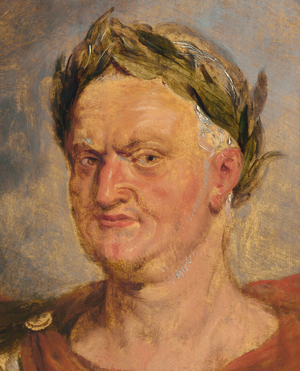
Your complimentary articles
You’ve read one of your four complimentary articles for this month.
You can read four articles free per month. To have complete access to the thousands of philosophy articles on this site, please
The Art of Living
The Importance of the Purple
Massimo Pigliucci looks for threads of integrity in a morally compromised world.
In the tumultuous political landscape of ancient Rome, few stories better illustrate the ideal of moral courage than that of Helvidius Priscus, a Roman senator who faced Emperor Vespasian with remarkable fortitude.
During Vespasian’s reign (69-79 CE), Priscus found himself in a direct confrontation with imperial power. When ordered not to attend a Senate meeting in order not to potentially embarrass Vespasian with a public confrontation, Priscus responded with characteristic clarity: “You have the power to disqualify me as a senator, but as long as I am one, I’m obliged to attend meetings.” The Emperor, seemingly willing to compromise, permitted his attendance, but demanded his silence. Priscus, however, understood that his duty transcended mere physical presence: “Don’t ask me for my opinion and I’ll keep quiet.” When Vespasian insisted he would be expected to seek his counsel, Priscus replied, “And I’m bound to say what seems right.” The exchange reached its dramatic climax when Vespasian threatened execution. Priscus’s response exemplifies an acceptance of mortality and commitment to virtue: “Did I ever tell you that I was immortal? You do your job and I’ll do mine. Yours is to send me into exile and mine to leave without grieving. Yours may be to put me to death and mine to die without fear.” Priscus understood that his role as senator carried responsibilities that transcended even the emperor’s commands.

Vespasian by Rubens
The exchange showcases the essence of Stoic philosophy, which is the recognition that while external circumstances lie beyond our control, our response to them remains entirely our own. The Stoic teacher Epictetus (c.50-c.138 CE) summarized the point of the story thus: “So did Priscus do any good? After all, he was just a single individual. But what ‘good’ does the purple do the toga? All it does is stand out in it as purple and serve as a model of beauty for the rest of the threads” (Discourses, 1.2.22). So, like a thread of purple through a white toga that stands out brilliantly among the common cloth, Priscus’s moral example serves as an enduring model of integrity. His story reminds us that even a single individual, committed to principle rather than to personal safety, can illuminate the path of virtue for generations to follow.
What was the disagreement between Priscus and Vespasian? The Emperor wanted to manage the state finances directly, but Priscus, in his role of Praetor (a high level magistrate), reminded Vespasian that the power of the purse, as we call it today, rested with the Senate, not the Emperor.
Priscus was not new to having a principled opposition to power. During the reign of Nero he had declared his sympathies for Brutus and Cassius, the conspirators who killed Julius Caesar as an emerging tyrant on the Ides of March 44 BCE. That kind of declaration amounted to questioning the very authority of the Emperor – as a result of which Priscus was sent into exile in 66 CE. He was recalled to Rome two years later by yet another emperor, Galba. But soon he managed to run afoul of Vespasian and be sent into exile for a second time. Shortly thereafter, he was assassinated on Vespasian’s orders. In his Discourses, Epictetus (who was in turn exiled by the Emperor Domitian, Vespasian’s son), tells us that what Priscus did was simply to properly play two of his roles in life: that of a Roman senator, and that of a member of the human cosmopolis. Both roles compelled him to reject the arbitrary actions of the emperor, even at the potential cost of his own life.
One doesn’t become like Priscus overnight. Growing moral fiber requires time and effort – what Epictetus calls our ‘winter training’, referring to the exercises Roman soldiers carried out during the winter in order to get ready for their military campaigns in the spring. A bit less dramatically, we may draw an analogy with practicing in order to prepare ourselves to run a marathon. If we did nothing for months then all of a sudden started running, we would not be able to complete the forty-two kilometer challenge. It’s only by building up our strength and endurance little by little that we may hope to get ourselves in the necessary shape. The same is true for our moral fortitude. Some of us may be naturally prone toward acts of heroism, but I’m guessing most are not. Nevertheless, we can practice courage by nudging ourselves to speak out whenever we see injustice, even though it may be uncomfortable and perhaps invite retaliation from strangers, colleagues, or bosses. As Epictetus tells his students: “The only thing you need to take into consideration is the price at which you sell your integrity. Listen, man, whatever else you do, don’t sell it cheap!” (Discourses, 1.2.33).
© Prof. Massimo Pigliucci 2025
Massimo Pigliucci is the K.D. Irani Professor of Philosophy at the City College of New York. His books include How to Be a Stoic: Using Ancient Philosophy to Live a Modern Life (Basic Books) and Beyond Stoicism: A Guide to the Good Life with Stoics, Skeptics, Epicureans, and Other Ancient Philosophers (with Greg Lopez and Meredith Kunz, The Experiment). More by him at massimopigliucci.org.









